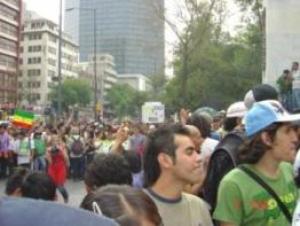
[I]n 2010, the crimes of possession and consumption accounted for 71 percent of all drug-related investigations initiated by the Public Prosecutor’s Office (Ministerio Público). Of all the rulings (convictions or acquittals) issued in 2010 for drug-related crimes, 18,343 -- 80.7 percent -- were for a single crime, meaning that no other crime was committed apart from the drug offense for which the person was sentenced or absolved.
The report also found disproportionate punishment for persons convicted of nonviolent distribution offenses:
[T]he maximum prison sentence for the crimes of production, commerce, supply, and trafficking of drugs -- all non-violent crimes -- is more than the maximum sentence established for violent crimes, including intentional homicide, rape -- both of minors and adults -- and robbery. The maximum prison sentence established for rape among adults is 11 years shorter than the maximum sentence established for drug offenses, and the maximum sentence established for robbery is 15 years, 10 years less than for drug crimes.
We see this kind of reversal of justice in the United States, of course, through the much-criticized sentencing guidelines and mandatory minimums. Mexico's public prosecutor's office does not seem more able or inclined to target its resources toward violent crime or the highest levels of the drug trade then the US Dept. of Justice does.
Of course in Mexico they have a full-blown crisis of drug trade violence -- prompting many Mexicans to call for legalization or at least a serious examination of it. So far the incoming president has vowed to continue to pursue the same strategies that led to the crisis, and it sounds like he has the full support of the prosecutor's office. But eventually things have to give.
This work by StoptheDrugWar.org is licensed under Creative Commons Attribution-ShareAlike 4.0 International
Add new comment